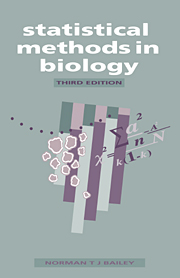Book contents
- Frontmatter
- Contents
- Preface
- 1 Introduction
- 2 Variability and frequency distributions
- 3 Estimation, standard errors and confidence limits
- 4 The basic idea of a significance test
- 5 Simple significance tests based on the normal distribution
- 6 The use of t-tests for small samples
- 7 Contingency tables and χ2
- 8 χ2-tests of goodness-of-fit and homogeneity
- 9 The correlation of measurements
- 10 Regression analysis
- 11 Simple experimental design and the analysis of variance
- 12 Introduction to factorial experiments
- 13 Random samples and random numbers
- 14 Partial correlation and multiple regression
- 15 Non-parametric and distribution-free tests
- 16 Notes on numerical calculation, calculators and computers
- Suggestions for more advanced reading
- Summary of statistical formulae
- Appendix tables
- Index
4 - The basic idea of a significance test
Published online by Cambridge University Press: 05 June 2012
- Frontmatter
- Contents
- Preface
- 1 Introduction
- 2 Variability and frequency distributions
- 3 Estimation, standard errors and confidence limits
- 4 The basic idea of a significance test
- 5 Simple significance tests based on the normal distribution
- 6 The use of t-tests for small samples
- 7 Contingency tables and χ2
- 8 χ2-tests of goodness-of-fit and homogeneity
- 9 The correlation of measurements
- 10 Regression analysis
- 11 Simple experimental design and the analysis of variance
- 12 Introduction to factorial experiments
- 13 Random samples and random numbers
- 14 Partial correlation and multiple regression
- 15 Non-parametric and distribution-free tests
- 16 Notes on numerical calculation, calculators and computers
- Suggestions for more advanced reading
- Summary of statistical formulae
- Appendix tables
- Index
Summary
Ada, Agnes, Alice, Amy, Angela … Each year or two Mrs Smith has a new baby, and so far all five children have been girls. Not a very surprising occurrence perhaps, for if you look far enough a field you will find a few families with even larger numbers of children all of the same sex. Still, it will undoubtedly excite a certain amount of local comment amongst neighbours and relatives who are more interested in Mrs Smith and her children than in the composition of other more-or-less remote and unknown families. A biologist might well want to assess more exactly the view that Mrs Smith is prone to produce only girls, perhaps with an eye on some possible explanation such as the inviability of Mr Smith's Y-bearing spermatozoa. Moreover, if Mrs Smith is anxious to have a son, the family doctor may be faced with some difficult problems in medicine, ethics and arithmetic. At the present stage a cautious person might be unwilling to say more than: ‘We can't really be sure yet that there is anything unusual happening; there's probably a fifty-fifty chance that the next child will be a boy’. But suppose the series continues with Arabella and Augusta – the evidence for some abnormality is clearly stronger. To take a logically similar situation, there comes a point when you suspect that the person who repeatedly spins his or her own coin and correctly calls heads each time is either cheating in his or her calling or has a heavily biased or even two-headed coin.
Information
- Type
- Chapter
- Information
- Statistical Methods in Biology , pp. 31 - 37Publisher: Cambridge University PressPrint publication year: 1995
Accessibility standard: Unknown
Why this information is here
This section outlines the accessibility features of this content - including support for screen readers, full keyboard navigation and high-contrast display options. This may not be relevant for you.Accessibility Information
- 2
- Cited by
